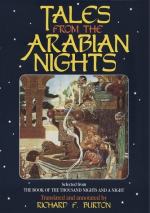[FN#343] The Koran says (chaps. ii.): “Your wives are your tillage: go in therefore unto your tillage in what manner so ever ye will.” Usually this is understood as meaning in any posture, standing or sitting, lying, backwards or forwards. Yet there is a popular saying about the man whom the woman rides (vulg. St. George, in France, le Postillon); “Cursed be who maketh woman Heaven and himself earth!” Some hold the Koranic passage to have been revealed in confutation of the Jews, who pretended that if a man lay with his wife backwards, he would beget a cleverer child. Others again understand it of preposterous venery, which is absurd: every ancient law-giver framed his code to increase the true wealth of the people—population—and severely punished all processes, like onanism, which impeded it. The Persians utilise the hatred of women for such misuse when they would force a wive to demand a divorce and thus forfeit her claim to Mahr (dowry); they convert them into catamites till, after a month or so, they lose all patience and leave the house.
[FN#344] Koran lit 9: “He will be turned aside from the Faith (or Truth) who shall be turned aside by the Divine decree;” alluding, in the text, to the preposterous venery her lover demands.
[FN#345] Arab. “Futuh” meaning openings, and also victories, benefits. The lover congratulates her on her mortifying self in order to please him.
[FN#346] “And the righteous work will be exalt”: (Koran xxxv. 11) applied ironically.
[FN#347] A prolepsis of Tommy Moore:—
Your
mother says, my little Venus,
There’s
something not quite right between us,
And
you’re in fault as much as I,
Now,
on my soul, my little Venus,
I
swear ’twould not be right between us,
To
let your mother tell a lie.
But the Arab is more moral than Mr. Little. as he purposes to repent.
[FN#348] Arab. “Khunsa” flexible or flaccid, from Khans=bending inwards, i.e. the mouth of a water-skin before drinking. Like Mukhannas, it is also used for an effeminate man, a passive sodomite and even for a eunuch. Easterns still believe in what Westerns know to be an impossibility, human beings with the parts and proportions of both sexes equally developed and capable of reproduction; and Al-Islam even provides special rules for them (Pilgrimage iii. 237). We hold them to be Buffon’s fourth class of (duplicate) monsters belonging essentially to one or the other sex, and related to its opposite only by some few characteristics. The old Greeks dreamed, after their fashion, a beautiful poetic dream of a human animal uniting the contradictory beauties of man and woman. The duality of the generative organs seems an old Egyptian tradition, at least we find it in Genesis (i. 27) where the image of the Deity is created male and female, before man was formed out of the dust of the ground (ii. 7). The old tradition found its way to India (if the Hindus did not borrow the idea from the Greeks); and one of the forms of Mahadeva, the third person of their triad, is entitled “Ardhanari"=the Half-woman, which has suggested to them some charming pictures. Europeans, seeing the left breast conspicuously feminine, have indulged in silly surmises about the “Amazons.”




